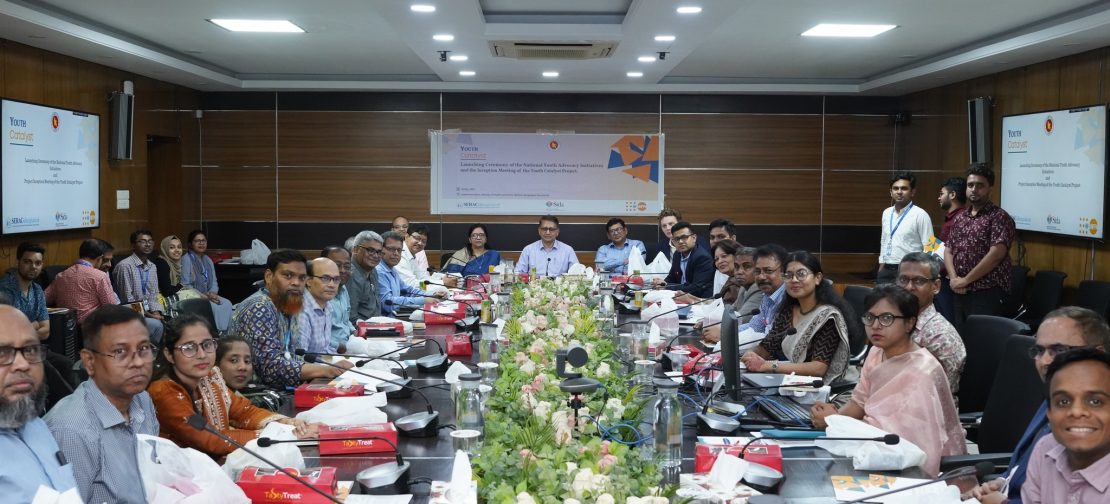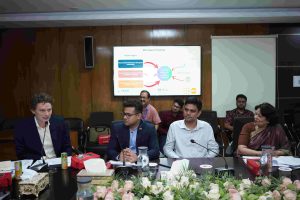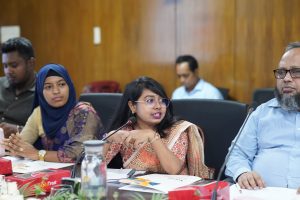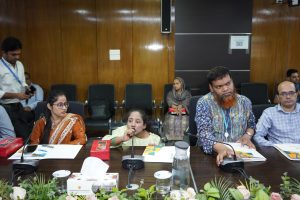
A high-level inception meeting convened on 20th May 2025 at the Ministry of Health and Family Welfare officially launched the Youth Catalyst Project—a transformative youth-driven effort to influence national policies on sexual and reproductive health and rights (SRHR) and climate resilience. This youth-driven initiative, implemented by SERAC-Bangladesh with technical support from UNFPA Bangladesh and funded by Sida, aims to influence reforming national policies and programs on sexual and reproductive health and rights (SRHR) and climate resilience, with a focus on reaching marginalized and climate-vulnerable communities.
 Chaired by Dr. Md. Sarwar Bari, Secretary, Medical Education and Family Welfare Division, the event brought together senior government officials, academia, and development partners. In his remarks, Dr. Bari emphasized the need for youth-centered and cross-sectoral policy reform that links health with education, climate, and broader social development. Dr. Ashrafi Ahmed, Director General of Family Planning, highlighted the urgency of addressing child marriage and teenage pregnancy, advocating for accurate, accessible SRHR information for all youth. Dr. Vibhavendra Singh Raghuvanshi, Chief of Health at UNFPA Bangladesh, traced the program’s inception and emphasized the government’s active involvement and Sida’s strong partnership. He announced the development of a National Youth Position Paper through broad-based consultations across divisional, district, and national levels. Felix Helgesson, Second Secretary at the Embassy of Sweden, underscored the significance of youth leadership in advancing SRHR and climate justice, linking the project’s vision to Sweden’s foreign policy and recent youth movements in Bangladesh.
Chaired by Dr. Md. Sarwar Bari, Secretary, Medical Education and Family Welfare Division, the event brought together senior government officials, academia, and development partners. In his remarks, Dr. Bari emphasized the need for youth-centered and cross-sectoral policy reform that links health with education, climate, and broader social development. Dr. Ashrafi Ahmed, Director General of Family Planning, highlighted the urgency of addressing child marriage and teenage pregnancy, advocating for accurate, accessible SRHR information for all youth. Dr. Vibhavendra Singh Raghuvanshi, Chief of Health at UNFPA Bangladesh, traced the program’s inception and emphasized the government’s active involvement and Sida’s strong partnership. He announced the development of a National Youth Position Paper through broad-based consultations across divisional, district, and national levels. Felix Helgesson, Second Secretary at the Embassy of Sweden, underscored the significance of youth leadership in advancing SRHR and climate justice, linking the project’s vision to Sweden’s foreign policy and recent youth movements in Bangladesh.
 Other prominent voices included Dr. Halida Hanum Akhter, Women’s Reform Commission; Prof. Dr. Iqbal Kabir, MoHFW; Prof. Dr. Mohammad Mainul Islam, University of Dhaka; Dr. Sultan Ahmmed, DGFP; and others, each reinforcing the urgency of youth-informed, inclusive policymaking. SM Shaikat, Executive Director of SERAC-Bangladesh, presented the project roadmap and called for stronger alignment between grassroots youth voices and national commitments on SRHR, climate action, and global development agendas. Dr. ASM Hasan, SRHR Specialist at UNFPA, reiterated that youth engagement in policymaking is no longer optional but critical to building inclusive and forward-looking health and climate systems.
Other prominent voices included Dr. Halida Hanum Akhter, Women’s Reform Commission; Prof. Dr. Iqbal Kabir, MoHFW; Prof. Dr. Mohammad Mainul Islam, University of Dhaka; Dr. Sultan Ahmmed, DGFP; and others, each reinforcing the urgency of youth-informed, inclusive policymaking. SM Shaikat, Executive Director of SERAC-Bangladesh, presented the project roadmap and called for stronger alignment between grassroots youth voices and national commitments on SRHR, climate action, and global development agendas. Dr. ASM Hasan, SRHR Specialist at UNFPA, reiterated that youth engagement in policymaking is no longer optional but critical to building inclusive and forward-looking health and climate systems.
 Two national youth advocacy platforms were also introduced: the Bangladesh Youth Health Action Network (BYHAN) and the Youth Coalition for Climate Justice (YCCJ)—designed to accelerate youth contributions to key policy instruments including the National Population Policy, National Family Planning Strategic Plan (2024–2030), National Adolescent Health Strategy (2017–2030), and National Adaptation Plan (2023–2050). The event concluded with an open youth-policy dialogue, moderated by Sainee Aziz, Senior Assistant Secretary, where youth from across the country raised pressing issues—from menstrual health in garment sectors and service disruptions during disasters to SRHR access for youth with disabilities and gender-based violence in crisis shelters.
Two national youth advocacy platforms were also introduced: the Bangladesh Youth Health Action Network (BYHAN) and the Youth Coalition for Climate Justice (YCCJ)—designed to accelerate youth contributions to key policy instruments including the National Population Policy, National Family Planning Strategic Plan (2024–2030), National Adolescent Health Strategy (2017–2030), and National Adaptation Plan (2023–2050). The event concluded with an open youth-policy dialogue, moderated by Sainee Aziz, Senior Assistant Secretary, where youth from across the country raised pressing issues—from menstrual health in garment sectors and service disruptions during disasters to SRHR access for youth with disabilities and gender-based violence in crisis shelters.
The outcomes will feed into the development of a national, youth-led Position Paper,
setting the stage for sustained engagement between youth and policymakers to shape
Bangladesh’s health and climate resilience agenda.